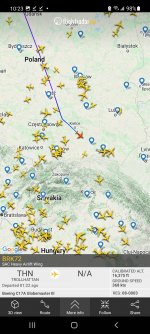Yep the treaty of 1654 was conveniently lost the moment it was signedIt funny reading the boards and how everyone tries to correlate a 500 year grudge match to modern history.
The whitest of the white fight over shades of white.
Just like the shades of black, brown, tan, yellow, olive, pink and red tgat fight over shades and BTW whose women end up with orange hair trying to do at home blonde from a box dye job.
Ukraine | Article about Ukraine by The Free Dictionary
. The harsh conditions of Polish rule led many Ukrainians to flee serfdom and religious persecution by escaping beyond the area of the lower Dnieper rapids. There they established a military order called the Zaporizhzhya Sich ("clearing beyond the rapids"). These fugitives became known as Cossacks or Kozaks, an adaptation of the Turkic word kazak, meaning "outlaw" or "adventurer." In 1648 the Cossacks, led by Hetman Bohdan Chmielnicki, successfully waged a revolution against Polish domination.
Ukraine, however, was too weak to stand alone, and in 1654 Chmielnicki recognized the suzerainty of Moscow in the Treaty of Pereyaslavl. By the terms of the treaty, Ukraine was to be largely independent; but Russia soon began to encroach upon its rights (the czars contemptuously referred to the Ukrainians as "Little Russians," as contrasted with the "Great Russians" of the Muscovite realm). Through a treaty with Poland in 1658, Ukraine attempted to throw off Russian protection. The ensuing Russo-Polish war ended in 1667 with the Treaty of Andrusov, which partitioned Ukraine.Russia obtained left-bank Ukraine, east of the Dnieper River and including Kiev; Poland retained right-bank Ukraine. Hetman Ivan Mazepa, presiding over a diminished Cossack state, sought once again to free Ukraine from Russian domination; he thus joined Sweden against Russia in the Northern War, but their defeat at Poltava by Czar Peter I in 1709 sealed the fate of Ukraine. Mazepa's fall crushed the last hopes for Ukrainian independence and further curtailed Ukrainian autonomy.
The last of Ukraine's hetmans was forced by Empress Catherine II to resign in 1764; the Zaporizhzhya Sich was razed by Russian troops in 1775, and Ukraine, its political autonomy terminated, was divided into three provinces. In 1783, Russia annexed the khanate of Crimea. The Polish partition treaties of 1772, 1793, and 1795 (see Poland, partitions of
) awarded Podolia and Volhynia to Russia, thus reuniting left-bank and right-bank Ukraine; E Galicia went to Austria.







